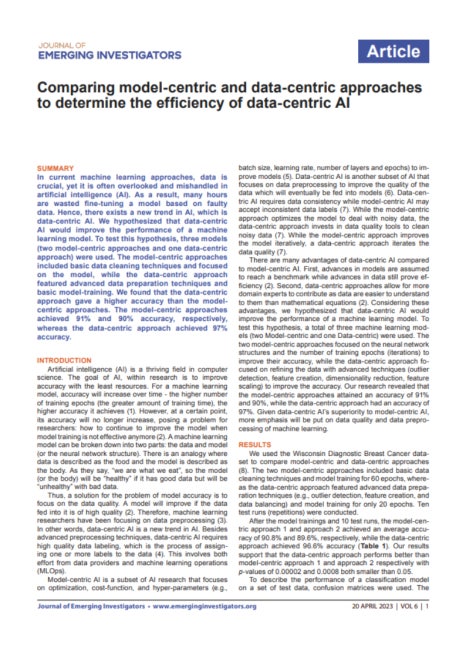|

If you’re a high school student interested in not just writing research papers but also publishing them, you can achieve significant results from a single paper. Today, we'll explore the Journal of Emerging Investigators (JEI), one of the prestigious international journals where high school students can publish their research.
About JEI
What is JEI? The Journal of Emerging Investigators (JEI) is an academic journal for high school and undergraduate students, offering a platform for publishing and sharing research in various scientific fields. Established to provide students with opportunities to conduct real scientific research and present their findings academically, JEI upholds high standards and credibility through a rigorous review process. This ensures that the research is valid and of high quality.
The Review Process in JEI
Submission |
Researchers submit their papers to JEI, including documents that explain the content, purpose, experimental design, and results of their research. |
Editorial Screening |
The editorial team reviews the submission to ensure it meets academic standards and falls within the journal’s scope. Papers that do not meet these basic requirements may be rejected at this stage. |
Reviewer Assignment |
The editors assign the paper to expert reviewers who possess the necessary knowledge in the field of study. |
Peer Review |
Reviewers evaluate the paper’s quality, methodology, results interpretation, and conclusions. They may suggest additional experiments or modifications if needed. |
Feedback and Revision |
Based on the reviewers’ feedback, the authors revise and improve their paper. This stage may involve conducting further experiments or providing additional explanations as requested by the reviewers. |
Re-review |
The revised paper is resubmitted to the reviewers for re-evaluation. They assess the changes and determine whether the paper has improved sufficiently. |
Final Decision |
After the review process is completed, the editors make a final decision based on the reviewers’ assessments and the quality of revisions. This decision could be acceptance, further revision, or rejection. |
Ensuring Quality in Research Papers Successfully navigating the review process hinges on the quality and academic content of the research paper. To improve your chances, consider the following aspects. These aspects, though fundamental, can often be overlooked when writing a paper independently. Therefore, understanding the basics of research paper writing and having a clear overview of your paper’s flow are essential before starting.
- Clarity and Structure: Ensure your paper is written clearly and follows a logical structure. Your concepts, experimental processes, and results interpretation should be well-expressed. - Consistency in Methods and Results: Maintain consistency in your experimental design and analysis methods. The logical flow between your methods and results is crucial for evaluation.
Case Study One of the research papers published in JEI compares the efficiency of model-based approaches versus data-centric approaches.

This paper illustrates how high school students can gain academic experience and showcase their research. By presenting and sharing research findings, students can contribute to the academic community and engage in scholarly communication.
The Significance of Publishing in JEI Publishing your research in JEI can open doors to a future as a researcher. It can be beneficial for college admissions and building a career in research. The experience and success gained from publishing research can influence future endeavors in research or other fields. The opportunity to publish in JEI is a significant experience that demonstrates how students can grow academically and have a lasting impact. By sharing your creativity and discoveries with a broader audience through JEI, you can achieve your publication goals and contribute meaningfully to the scientific community. |
 Click here to book
Click here to book